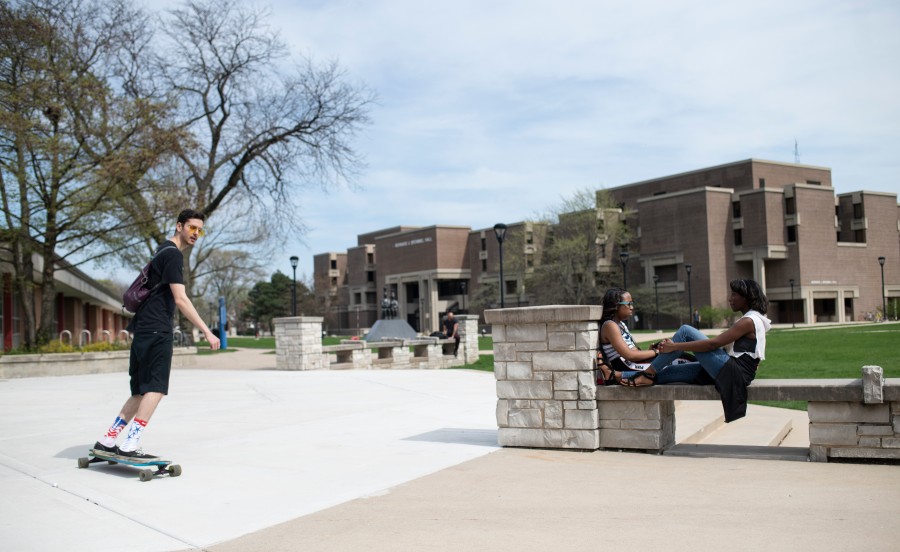‘Let’s Be Honest With Students’: Beyond The Idea That College Is Always The Answer
By Susie An

Anahi Ramirez is interested in a lot of things — literature, Spanish and international issues, to name a few. The 18-year-old is spending a lot of time these days thinking about what a career would look like in one of those fields.
But as the Waukegan High School senior considers life after graduation, she feels her school is only pushing four-year colleges.
“They just basically say, ‘Oh, you have to go to college, and if you don’t, you’re not going to do anything. You’re going to live with your parents for the rest of your life,’” she said.

High schools across the country usually promote a four-year college degree as the main option, but it’s not right for every student — and not everyone is prepared for it.
Last year, 60% of Waukegan High School graduates in the northern suburb enrolled in some kind of post-secondary program within a year of graduating, but many of them had little guidance before they went.
That’s something that Beacon Place is trying to change. The small organization in Waukegan is showing students the full range of options — including two-year degrees and certificate programs — and how to make them happen. Ramirez is getting support from the group.
“College for all is a misnomer,” said Anne Durot, program manager at Beacon Place. “Post-secondary opportunity and a path with a plan, that’s what we should be talking about.”
The program explicitly breaks down the steps for students to reach their goals. That could be how to get in to a four-year college and what to expect once there. It could also be taking a look at a student’s skills and showing them their own path to a certificate program, like in manufacturing or early childhood education.
“What we work really hard to do is make sure that our students understand that they have choice, but their responsibility is to actively look and consider what those choices might be,” Durot said.
The National Student Clearinghouse Research Center finds that about a quarter of students who enrolled in any college in the fall of 2017 did not return for their second year.
“Not all high school students are aware there are many different types of colleges they can consider,” said Mikyung Ryu, director of research publications at National Student Clearinghouse. “There are public four-year colleges, community colleges, trade school.”
Anything other than a four-year program can be treated as a lesser option. Ryu said research shows that for certain fields, a person with an associate’s degree can out-earn their peers with bachelor’s degrees. For example, workers with associate’s degrees in chemical technology have median earnings of about $75,500, compared to their peers with bachelor’s degrees with a median earnings of about $50,600. She said it’s the lack of information that puts students at a disadvantage.
“Particularly what concerns the research community in terms of lack of access to information is the students who are historically, traditionally underserved,” she said.
Making a choice that “resonates”
Anne Durot said some students don’t think about what happens after graduation until they get to 11th grade. That’s a problem, especially for kids who go to community college without realizing they could have to take remedial classes, now called developmental education.
“They get in those remedial courses, and the odds are totally against them of ever completing any meaningful degree,” she said.
In 2017, most Waukegan High School graduates that went to a community college had to take remedial classes. Students have to pass those courses before going on to college-level classes and many higher-paying trade careers require an associate’s degree. Durot said Beacon Place helps students understand that failing those remedial community college classes can be a major hurdle, and they try to intervene before students get to that point.
She says they also help students decide whether a four-year degree is the right choice.
“Let’s be honest with students,” she said. “You got a C average, and you don’t like doing homework. I’m not quite sure that a four-year degree makes a lot of sense for you, but do you know there are these opportunities available to you?”
High school freshman Roger Vargas knows he wants to be a mechanic. He’s already looking at the options to get there.
“That only takes two years, and if I want to I can [also] become … a technician. I feel like doing that, you open yourself up to more things,” he said.
Durot recalls one student who wanted to go to a four-year college to become an engineer, but didn’t have the grades to get there. They walked him through the process of getting in an apprenticeship program. Now, he’s excited about his first job in manufacturing, she said.
“It’s got to be something that resonates with you,” she added. “Meets your desires, meets your skill sets, meets your goals.”
Susie An covers education for WBEZ. Follow her on Twitter @WBEZeducation and @soosieon.